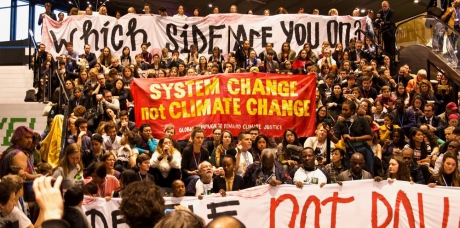Features
You are here
Climate crisis poses stark choice: Socialism or Extinction

August 11, 2022
Book review, Socialism or Extinction: The Meaning of Revolution in a Time of Ecological Disaster, by Martin Empson
In his latest book, Socialism or Extinction: The Meaning of Revolution in a Time of Ecological Disaster, Martin Empson neatly lays out his argument as to why the climate crisis cannot be solved under capitalism. The title itself references Rosa Luxemburg’s use of the words ‘socialism or barbarism’ to describe the choice facing humankind during World War I, thus underlining both the higher stakes we currently face with climate change, but also referencing the role of revolution in bringing that conflict to an end.
As a longstanding environmentalist, socialist and member of the Socialist Workers Party (UK), Empson is bringing to this work years of activism and discussion. As such, he describes the work as ‘an unapologetic defense of revolution’.
Empson puts the work into context by describing the current environmental crisis facing the world, ‘a code red for humanity’ as per the 2021 report of the Intergovernmental Panel on Climate Change (IPCC). In outlining the urgency of addressing climate change, he references the particular impact on the global south and how closely the current crisis is tied to capitalism, citing loss of biodiversity, factory farming, unequal impacts to the poor and the global south.
By the very competitive nature of capitalism, he argues that it is inherently wasteful, and ‘endlessly hungry’. Not only does it function by anticipating future demand and thus creating waste when estimates are incorrect, but also its products and processes are in a state of constant change to get ahead of the competition.
By suggesting that industry developed a reliance on fossil fuel not to make production cheaper or more efficient, but to gain power over workers, he reinforces an inextricable link between fossil fuels and capitalism. He also argues that the climate crisis was created by capitalism, is inherent in capitalism and thus cannot be solved under capitalism, that the system must be dismantled and this can only be done by workers through a socialist revolution.
The limitation of top down approaches to fixing climate change is that making real change would be counterproductive to the tiny minority who hold so many of the world’s resources and concentrated power, and thus so many of the existing ‘solutions’ are simply greenwashing.
In defining the concept of socialist revolution, Empson is emphatic that it must be from the bottom up, using the power of workers to regain control the means of production. He discusses the role of violence in a revolution, saying that while socialists should not condemn violence out of hand, non-violence is a more successful method of making change. He emphasizes that such a global issue requires a global solution by transforming the world, and providing a decent life, home, diet, health and education to all.
In the second half of the book, Empson describes how society would work after a revolution, making the point that while revolution is not inevitable, it is possible where the status quo becomes untenable and enough workers come together to stand up to demand change and implement it.
He describes the conditions under which such a revolution would occur, and points out that the capitalist state itself was created by breaking down the feudal society that came before it. In analyzing previous revolutions, Empson illustrates how workers are capable of creating an effective workers state as long as they can defend it against counter revolution. The workers state would eventually fall away to socialism. Empson illustrates his theory with case histories of past revolutions, both in the recent past in Egypt, Sudan and further back with the Paris Commune and the Russian revolution of 1917. He does make the point that different factors must be at play to make a revolution successful, such as a mass mobilization of workers who are pushed to the point of refusing to continue under the current system, but as well, a significant number of socialists who are in place to provide support and guidance, as the Bolshevik Party did in 1917. The point that stands out in his examples is that again and again during periods of revolution, workers have come together, put aside their differences and worked effectively to organize their community. While each of these revolutions was part of a wider movement and/or spread geographically, Empson makes it clear that a socialist upheaval would effectively have to be worldwide to transcend and eventually break down borders to deal with a global issue.
Martin Empson effectively argues that only a socialist revolution can rescue us from imminent climate catastrophe. Building on the thought of Marx, Lenin and Luxemburg, he makes the case that this is urgently necessary and how it is possible. Along the way, he gives us examples of revolutionary communities successfully organized by the working class. While he does take the time to sketch out the issues of climate change that put us at risk, he does not map out climate solutions specifically, but instead makes the case that workers have the knowledge, the skills and the power to transition to a more sustainable socialist society. Socialism or Extinction is an engaging and compelling read.
(Socialism or Extinction: The Meaning of Revolution in a Time of Ecological Disaster, by Martin Empson is published by Booksmarks in the UK.)
Section:









